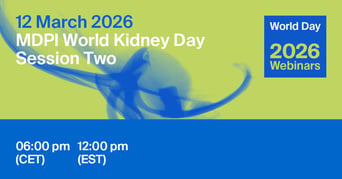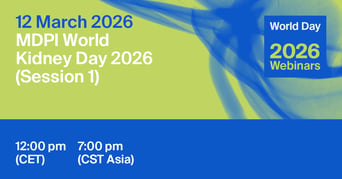- 3.4Impact Factor
- 6.0CiteScore
- 17 daysTime to First Decision
News & Conferences
Latest News & Announcements
Latest Conferences
Propose a Conference Collaboration
Promote and publicise your upcoming conference with MDPI.
All News & Conferences
MDPI Conference
MDPI Webinar | World Kidney Day (Session 2), 12 March 2026
12 - 12 March 2026
News & Announcements
MDPI Webinar | World Kidney Day (Session 2), 12 March 2026
3 March 2026
MDPI Conference
MDPI Webinar | World Kidney Day (Session 1), 12 March 2026
12 - 12 March 2026
News & Announcements
MDPI Webinar | World Kidney Day (Session 1), 12 March 2026
3 March 2026
News & Announcements
MDPI INSIGHTS: The CEO’s Letter #32 - MDPI China and Thailand, China Science Daily, 1,000 Partnerships, R2R
28 February 2026
News & Announcements
Meet Us at Heart Rhythm 2026, 23–26 April 2026, Chicago, USA
26 February 2026
News & Announcements
MDPI Virtual Academic Publishing Workshop (New Harvest), 25 February 2026
20 February 2026
News & Announcements
MDPI’s Open Access Program Reaches 1,000 Institutions Worldwide
18 February 2026
News & Announcements
Meet Us at the USCAP 115th Annual Meeting 2026, 21–26 March, San Antonio, Texas, USA
11 February 2026
News & Announcements
Acknowledgment to the Reviewers of Life in 2025
6 February 2026
News & Announcements
MDPI INSIGHTS: The CEO's Letter #31 - MDPI 30 Years, 500 Journals, UK Summit, Z-Forum Conference, APE
2 February 2026
News & Announcements
World Neglected Tropical Diseases Day, 30 January 2026
29 January 2026
of 22













